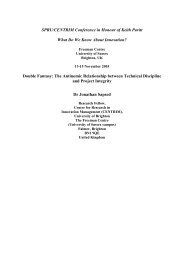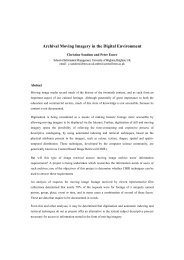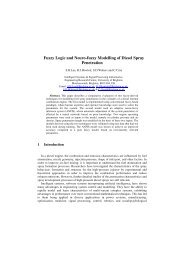NESTA Crime Online - University of Brighton Repository
NESTA Crime Online - University of Brighton Repository
NESTA Crime Online - University of Brighton Repository
Create successful ePaper yourself
Turn your PDF publications into a flip-book with our unique Google optimized e-Paper software.
ecruitment marketplace for cybercriminals and (3) they contain vast amounts <strong>of</strong><br />
personal information that can be used for identity theft. 76<br />
MySpace or Cybercrookspace?<br />
Cybercrooks are increasingly using MySpace and Facebook to recruit people, network,<br />
spread malware, and steal personal information. Cybercriminals are exploiting the<br />
popularity <strong>of</strong> social networking sites to steal identities or craft more personalised fraud<br />
attempts. Facebook, which has exploded in popularity in the UK in recent months, allows<br />
people to post detailed, personal information about themselves from their date <strong>of</strong> birth<br />
to the schools they attended – precisely the information that banks ask for as security<br />
questions. Someone’s mother’s maiden name, or place <strong>of</strong> birth, is now so easily<br />
available to become almost redundant. Tim Pie, at HSBC, said: “There will come a time<br />
when that sort <strong>of</strong> identification will become a thing <strong>of</strong> the past.”<br />
In August 2008 Kaspersky Lab discovered two worms that had been specifically<br />
designed to target MySpace and Facebook. Also, a federal judge has ordered a Canadian<br />
man to pay Facebook $873 million for blasting members <strong>of</strong> the social networking site<br />
with spam.<br />
Sources: Dan Kaplan, (2008), articles in http://www.scmagazineus.com/.; Harry Wallop,<br />
Consumer Affairs Correspondent (4 th July 2007), Fears over Facebook identity fraud, The<br />
Telegraph.<br />
76 Facebook adopted open innovation in 2007 by releasing Facebook Platform for application developers. Since<br />
then, thousands <strong>of</strong> third-party applications on Facebook have become available, which allows the developers to<br />
access information from those Facebook users that install these applications. Tightening security to protect the<br />
privacy and personal information from Facebook users would contradict the principles <strong>of</strong> open innovation,<br />
based on sharing information.<br />
Page 27
















